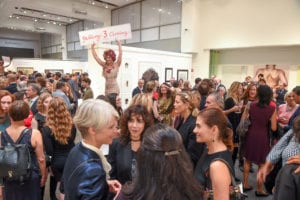Above (left to right): “Little Vixen 1,” “Little Vixen 2” and “Little Vixen 3” by Natalya Kochak
1. NATALYA KOCHAK
Represented by Irreversible Projects (at Spectrum) and Untitled Projects (at SCOPE)
While living and working in cities and countries around the world, Miami artist Natalya Kochak observed that the people in each residence were different, yet all shared common passions and pains. As a response, she uses consistent and predictable tools like printmaking to demonstrate our commonalities, yet produces works that emphasize and celebrate our imperfections. In an interview with Art Zealous, Kochak explained: “Identity is the most important thing we know as individuals, but it is lost in everything we do in our society,” so her works discuss issues of identity in our culture. The “Little Vixens” series is inspired by the influx of young girls “posing sexy” on the Internet. Every three prints are based on a single individual – the first is a solid portrait; the second, what Kochak calls “double vision”; and a third is abstracted. The first 15 works in the series (which consists of 30 pieces so far) are on display with Irreversible Projects. An unrelated large-scale piece, “Contemplation and Exhilaration,” can also be viewed with Untitled Projects.
2. OLAF METZEL
Represented by Wentrup (Booth B28) and Galerie Klüser
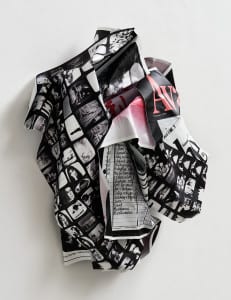
German artist Olaf Metzel’s large-scale sculptural installations address everyday social issues by transferring enlarged newspaper articles onto folded aluminum and stainless steel. For instance, “Time (Latin America Edition, August 20, 1965)” depicts the events of Los Angeles riots in 1965. He gives new context to the news – shaping both the viewers’ perspective and the physical materials of the sculpture. Olaf is selective in the news topics he portrays, thereby influencing the message that his viewers receive. By working with elements of “yesterday’s” newspaper (a material that is often thrown away), he gives it new purpose by transforming the contents of the paper into a piece of contemporary cultural commentary. He folds the sculptures’ sturdy aluminum in a way that is unnatural, much like the crumpling of an old newspaper being discarded. In doing so, he immortalizes the subjects on the page. Giving a new perspective to the news as a piece of resurfaced history prompts the viewer to digest powerful socio-cultural topics. Five wall sculptures are on view with Wentrup; another is represented by Galerie Klüser.
3. SPENCER FINCH
Represented by Galerie Nordenhake (Booth H9)
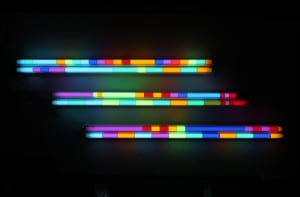
New Haven, CT artist Spencer Finch’s artistic approach acknowledges the poetic nature of scientific methodology. In “Study for Goldberg Variation 1, 2, 3,” he makes tangible a correlation between the color spectrum and the musical scale that was founded by Sir Isaac Newton. Bringing to fruition Newton’s color wheel, in which colors were assigned to musical notes, Finch translates Johann Sebastian Bach’s “Goldberg Variations No. 1, 2, 3” into color. The three pairs of shining fluorescent lights each represent the first few minutes of one “Goldberg Variation” – the top light signifies the left hand on the piano, the bottom light signifies the right hand. Finch’s keen sense of observation is also clear in his “Following a Bee” series of oil pastel drawing. This set of three drawings trace the flight path of bees collecting pollen from different flowers in Finch’s garden: Helianthus, Zinnia, Hydrangea.
4. TONY CRAGG
Represented by Galerie Thaddaeus Ropac (Booth C11)
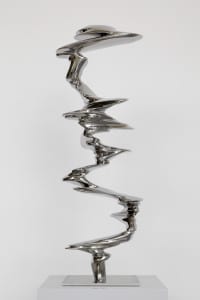
British sculptor Tony Cragg was known for his found object installations in the ‘80s before later gravitating toward a stronger focus on the form, material and shape of his works. Now engaging with sturdy materials like bronze, wood and stainless steel, he casts unlikely forms that appear to be liquid – futuristic yet familiar, figurative yet abstract – in which the appearance of the human profile is often eluded to in the work’s overall structure. These abstractions question the viewers’ opinion of the way something “should” look. Vertical towers of fluid-looking materials remain contained and stationary while seeming to twist, bend and spin as though on an imaginary axis.
5. JIANG PENGYI
Represented by ShanghART Gallery (Booth E13)
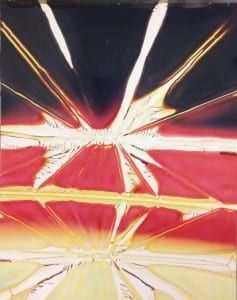
Beijing artist Jiang Pengyi creates works of art that result from exploring the unpredictable nature of light. By manipulating rays of light into delicate yet bold patterns on film, the artist essentially paints with light through means of photography. His “Inconsolable Memories” series observes the chemical reaction of light on aging Polaroid film and its varying outcomes. Jiang Pengyi’s study of light demonstrates intense comprehension of the subject in relation to time, space and mediums. The unpredictable nature of these chemicals is similar to the unpredictable effect of time on memories and life, as Pengyi (in his own description of the series) likens the aged film to memories left by an elderly man. While time can make things richer, traces of the past will still surface. Pieces 16-19 are on display at the fair.


